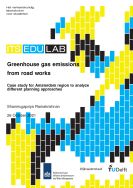During the previous century the transportation sector has been identified as one of the largest carbon footprint contributors. Emissions from the transportation industry originate from a range of sources, including vehicle operations as well as road construction and maintenance. With an increase in road users and an ageing infrastructure, new road infrastructure is being established and existing infrastructure is being managed with all kinds of measures. For the maintenance of their roads Rijkswaterstaat has initiated a program entitled ”Replacements and Renovations Program”, to enhance roadways so that they will always withstand increasing traffic and improve safety. Rijkswaterstaat strives for thorough maintenance planning that minimizes road closures, environmental damage, and traffic congestion.
There are several stages in a road maintenance project that might affect greenhouse gas emissions, including pre-construction, construction, maintenance, and rehabilitation. Some of these stages have already been the subject of study. The majority of researchers concentrate on the emissions connected with road construction from the materials utilized. But an effective way to reduce emission from the road works is to analyse different planning approaches and selecting the approach that minimize the disruption to the traffic. Simulation is used to calculate the emissions from various approaches and to predict these emissions. The A10 Amsterdam network was chosen for the research area and the road works are simulated along the A10-west motorway. For the road works, four scenarios were chosen: complete road closure on weekdays, complete road closure on weekends, partial road closure on weekdays, and partial road closure on weekends. The traffic simulations showed that the city routes passing through the A10 west motorways are most affected by the road closure. A framework for integrating the transportation and emission models was developed to calculate the emissions. According to the analysis, the partial road closure emits around 10 MT CO2e more greenhouse gas than the full road closure. The analysis demonstrates that it is possible to minimize project-related GHG-emissions during roadwork by by performing a full road closure during the weekdays which has the highest emission savings.
